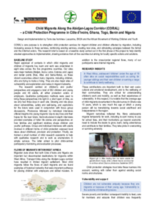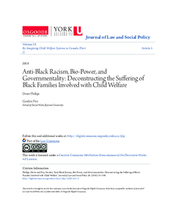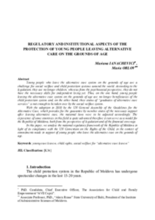Displaying 691 - 700 of 1796
This article examines the practice of child-centered principles in the UK child protection and public child law systems.
This research brief is based on a baseline study carried out in the first phase of the Child Migrants Along the Abidjan-Lagos Corridor (CORAL) project to help identify situated approaches to implementation, drawing evidence from all five countries but aiming for locally specific actions and solutions.
The Community Opportunity Map is a tool that allows users to see localized indicators connected to community health and maltreatment prevention.
This article focuses on how colonialism, anti-Black racism and white supremacy are embodied by Ontario’s child welfare system in relation to narratives of suffering experienced by Black families involved with this sector.
This volume is an effort to highlight best practices for children without parental care.
In this paper, the authors analyze the national regulatory framework of the Republic of Moldova in light of its compliance with the UN Convention on the Rights of the Child, in the context of commitments made in support of young people who leave the alternative care on the grounds of age.
The article presents the results of an empirical pilot study carried out on a sample of 24 child protection social workers employed in four public agencies in Italy.
This book draws on archival, oral history and public policy sources to tell a history of foster care in Australia from the nineteenth century to the present day.
This brief reference surveys the national policy of three representative African countries on the legal guardianship of children who are without parents or families.
This paper focuses on how the Family Assessment for Least Developed Countries (FA-LDC) instrument can be used as evidenced-based practice to assist social workers in statutory investigations.




